Meet the Black Anime Cosplayers Blowing Up on Instagram
Credit to Author: Janae Price| Date: Fri, 03 May 2019 13:41:54 +0000
Every Black anime fan has a coming-of-age story, a moment when they realized that the animation style is much more than a cartoon. My moment was when I was about nine or ten years old and I wasn’t sure if I like girls or boys.
At the time, my older sister would constantly swoon over Little Bow Wow and B2K, gushing over how “hot” they were. But when I’d look at these cornrowed black Ken dolls, I’d just feel… nothing. In the back of my naîve mind, I thought I could only like one gender or the other. If I had to choose, which would it be?
All of that youthful unease came to a crashing halt the day I watched future Trunks from Dragon Ball Z molly-whop Frieza and King Cool. At that moment, I realized that one day, I wanted a cool anime dude—one with rippling pectorals and glowing hair, who also happened to be the descendant of an ancient and powerful race. (My taste has remained relatively the same to this day.) From my first moment of discovering Trunks, I couldn’t get enough.
Although sexy anime boys are what piqued my interest, they certainly aren’t what kept me coming back. It was the samurai with wide, trusting eyes and a dark past in Rurouni Kenshin; the dedication and fierce loyalty Naruto always felt for his comrades; the multidimensional characters of Avatar: The Last Airbender that mirrored some of my own family members. I soon found that for every step and stage of my life, there was an anime to accompany me.
I am not the only Black person who feels that way. From Michael B. Jordan standing loud and proud to proclaim his love for the animation style to artists like Jaden Smith and Frank Ocean giving subtle nods to DBZ in their music to the “Hood Naruto” dance-fight video which has nearly 14 million views on YouTube. Black love for anime runs deep, which is why I gathered some of the dopest Black female cosplayers on Instagram to talk about why they fangirl for anime so hard.
Shellanin
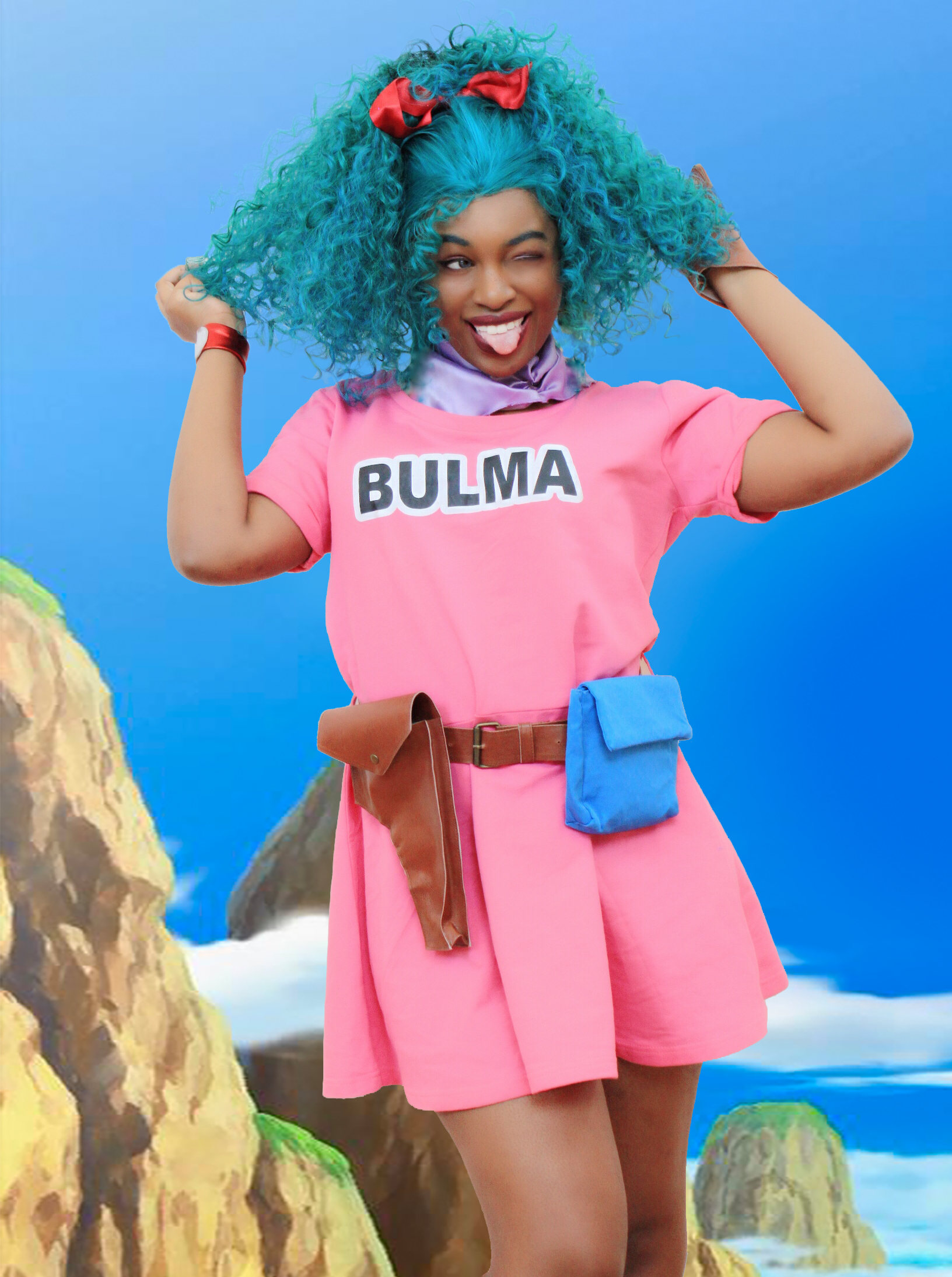
I’ve been in love with anime since middle school. Cartoon Network’s Toonami was definitely the gateway into the world of anime for me. After experiencing Toonami, I spent most of my time wishing that I could run alongside Naruto, and clap my hands together to perform alchemy like Edward Elric from Fullmetal Alchemist. I always saw myself within these characters. I’d dream of brown-skinned Sailor Scouts from Sailor Moon and Saiyans from Dragon Ball Z with Afro puffs like my own. This love for anime made me so excited for every Halloween—it was my only chance every year to dress up as my favorite anime character.
In middle school, I was able to meet others with similar interests. We walked the school halls with Naruto Leaf Village headbands and spent our lunch periods reading manga in the school library. Through these friends, I was able to learn about conventions and cosplay. And I was like, wow, cosplayers—people that don’t have to spend months waiting for Halloween to come around so they can dress up as their favorite characters. I knew I had to do it, too.
Even though I have a huge love for anime, Black people and people with darker skin tones are very underrepresented in these shows. I figured that when I cosplay, I should make my childhood dreams come true. So, when I cosplay, I redesign characters like Vegeta and Bulma from Dragon Ball Z to look like me. I want the world to reimagine what these characters would look like if they were me, a Black woman. In the future, I aim to cosplay characters like Misty from Pokémon and Deku from My Hero Academia. I use my hashtag #CurlyCosplay to spread the love of Afro curly hair within cosplay. With #CurlyCosplay, I get to be anyone I want to be while being myself at the same time, and I love it so much. My love for anime will always be shown within my cosplay work.
Kiera
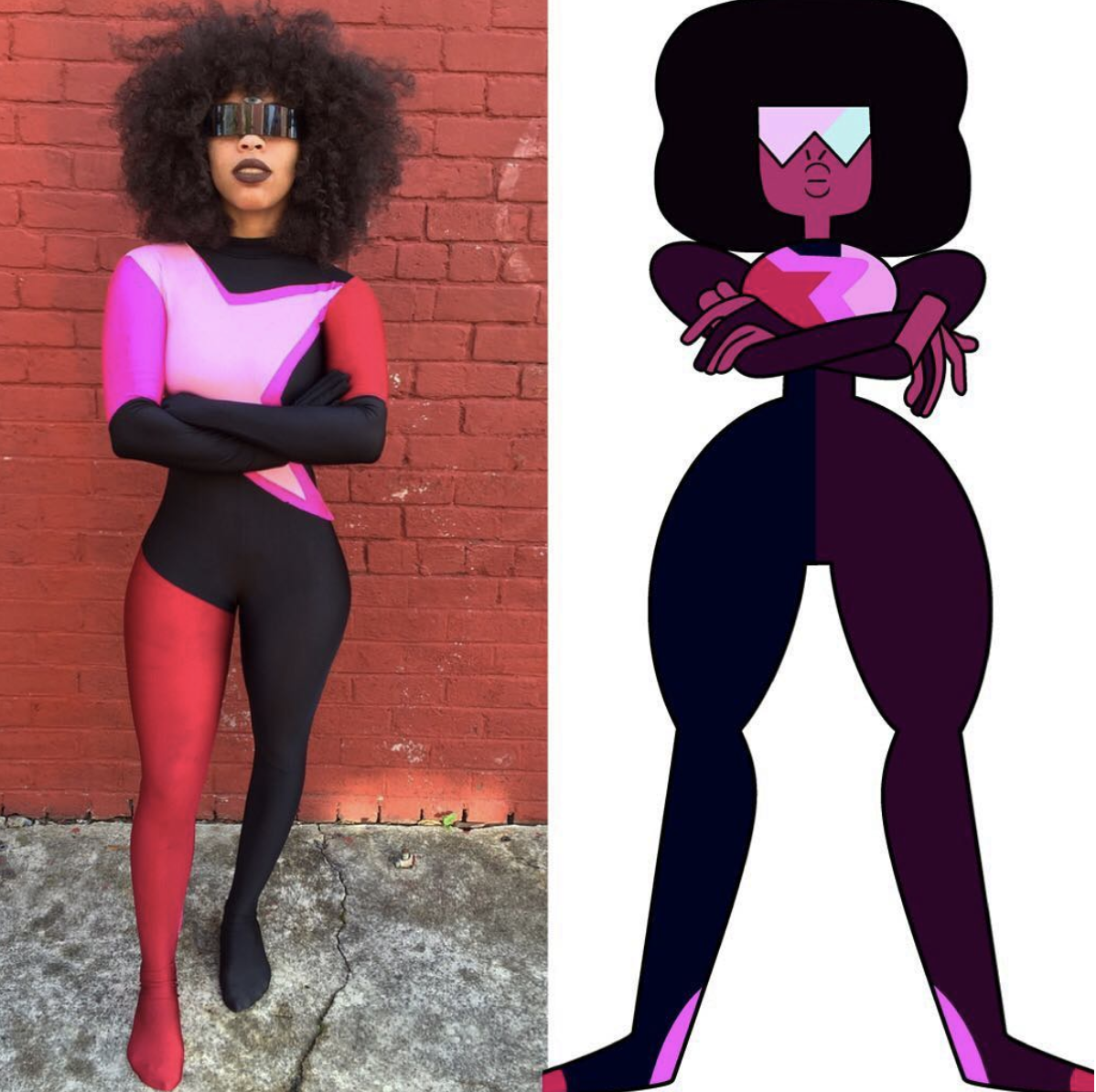
The first time I discovered the world of anime was because of my friend Teven. He had always been obsessed with it, and I never really understood why. I remember one day when he kept talking about this one particular anime called Future Diary; it intrigued me when he explained all the crazy things happening in the series. A few days later, I decided to give it a shot, and I instantly fell in love. I almost finished the entire series that night. The rest of the week consisted of me binging Future Diary and bugging my friend consistently for a new series to watch before the one I was obsessing over ended.
Cosplay was a similar story, too. People would always tell me I look like Garnet from Steven Universe, and that I should dress up like her. I always loved the show, so one Halloween, I decided to go for it. I never had taken Halloween seriously before, but something came over me this time. After that, I again became obsessed—planning my next character to dress up as despite the fact that Halloween had passed. Within doing that, I found a world and a hobby that I didn’t even know I would enjoy until I tried it.
I’ve always loved to express myself in new ways, so these outlets became an extension of me. Identifying with characters with weird backstories or magical abilities has made me view life in a much more playful and hopeful light!
Snitchery
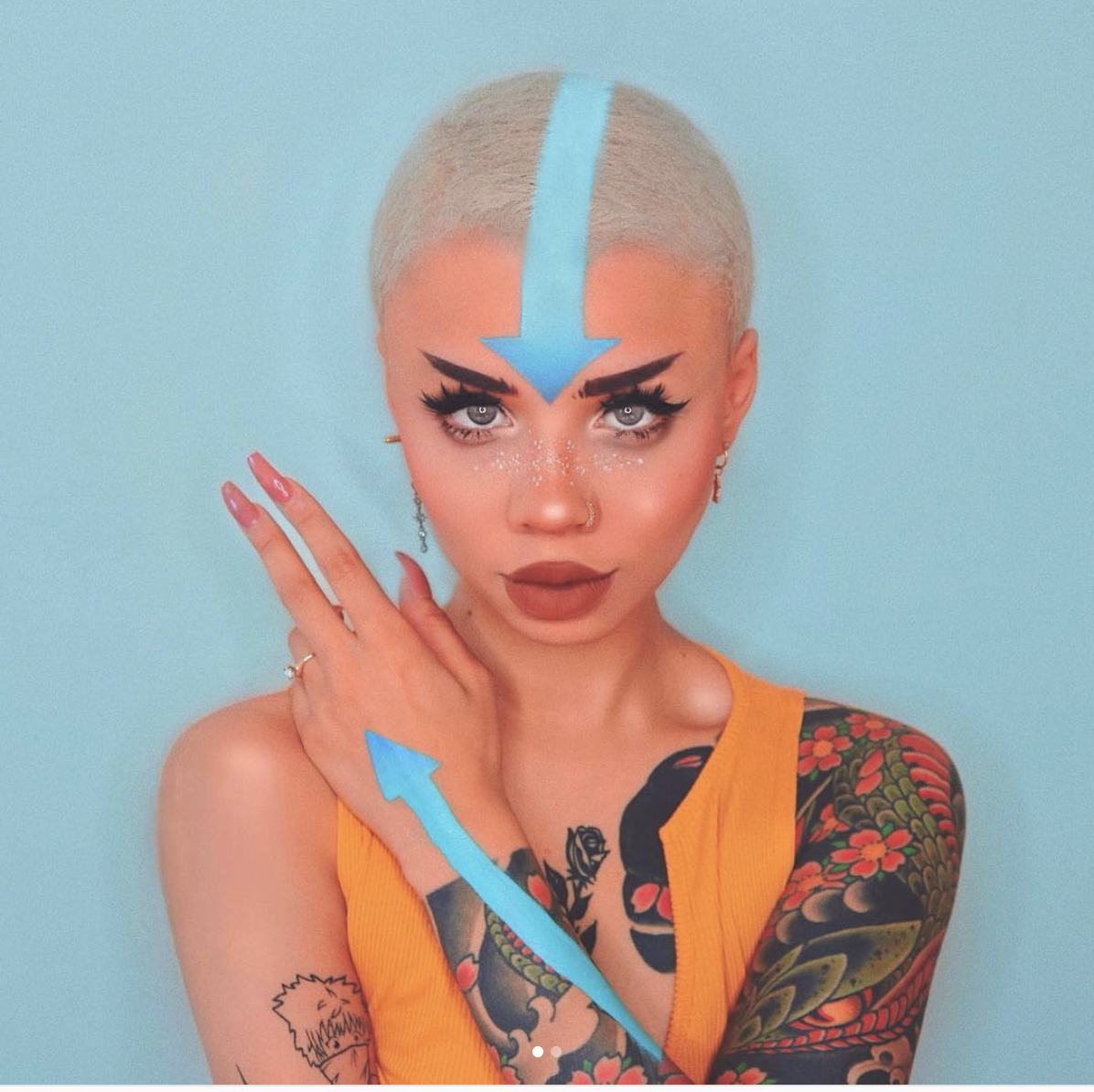
Anime has been a part of my life for over a decade now. I remember being ten years old, hovering over my little brother’s shoulder on Christmas night as we played Pokémon Emerald on a shared Gameboy Advance. When I learned about the accompanying television show at school a few weeks later, I was totally hooked.
Growing up biracial—my mother being white and my father being Black—in an overwhelmingly white community, my crush on Tamaki Suoh from Ouran High School Host Club or propensity for drawing manga in the corners of my homework just aided in making me a little different from my classmates. I had always taken pride in being an eccentric dresser. My history teacher once asked me, “What do people who dress like you all the time even wear for Halloween?” So while tying up my hair in Sailor Moon pigtails and pairing my Misa Amane [from Death Note]-inspired knee socks with an Aeropostale shirt in seventh grade probably wasn’t super on trend, my 12-year-old self really lived for it.
It wasn’t until I started my makeup Instagram account in 2014 that I took that inspiration to the next level, posting editorial beauty renditions of well-known anime characters and toying with the idea of full cosplay. Nowadays, I tend to post content that lands somewhere in the middle; 99 percent of my photos are self-shot headshots rather than full body pictures, which allows me to make sure that the wigs and makeup and what little of the outfit you can see in the final digital image are either super true to canon or a fresh twist on an animated character. And when I’m wearing a sleeveless top, the cropping gives way to a bit of my Killua [from Hunter X Hunter] and Cubone [from Pokémon] tattoos.
Overwhelmingly, the online response to my cosplays has been amazing, and the odd hate comment is so quickly swallowed up by a sea of love and support that I hardly ever see them. That said, those I do see are almost always racially fueled—how I, even as a very light-skinned women, am still too dark to cosplay as Kaneki [Tokyo Goul], how my lips are too big to “accurately” portray Misty [Pokémon], how Raven [Teen Titans] is my “best” cosplay because I based my skin with a grayish purple face paint. I’ve seen far worse in the comments of unambiguously black female cosplayers like @kieraplease and @mimithenerd, who are two of the best in the game. There’s this nasty idea held by an angry, vocal subset of the cosplay community that Black women should only cosplay as Black characters (as laughably limiting as it sounds given the medium), and a general stigma that Black people can’t be nerdy at all. For me, it can feel pretty liberating to do otherwise, especially when I’m given the chance to team up with other Black women in awesome cosplay collaborations. After a decade and some change, anime—and by extension, cosplay—is ridiculously central to my identity, and I wouldn’t trade my status as a geeky Black girl for the world.
BlackKrystel
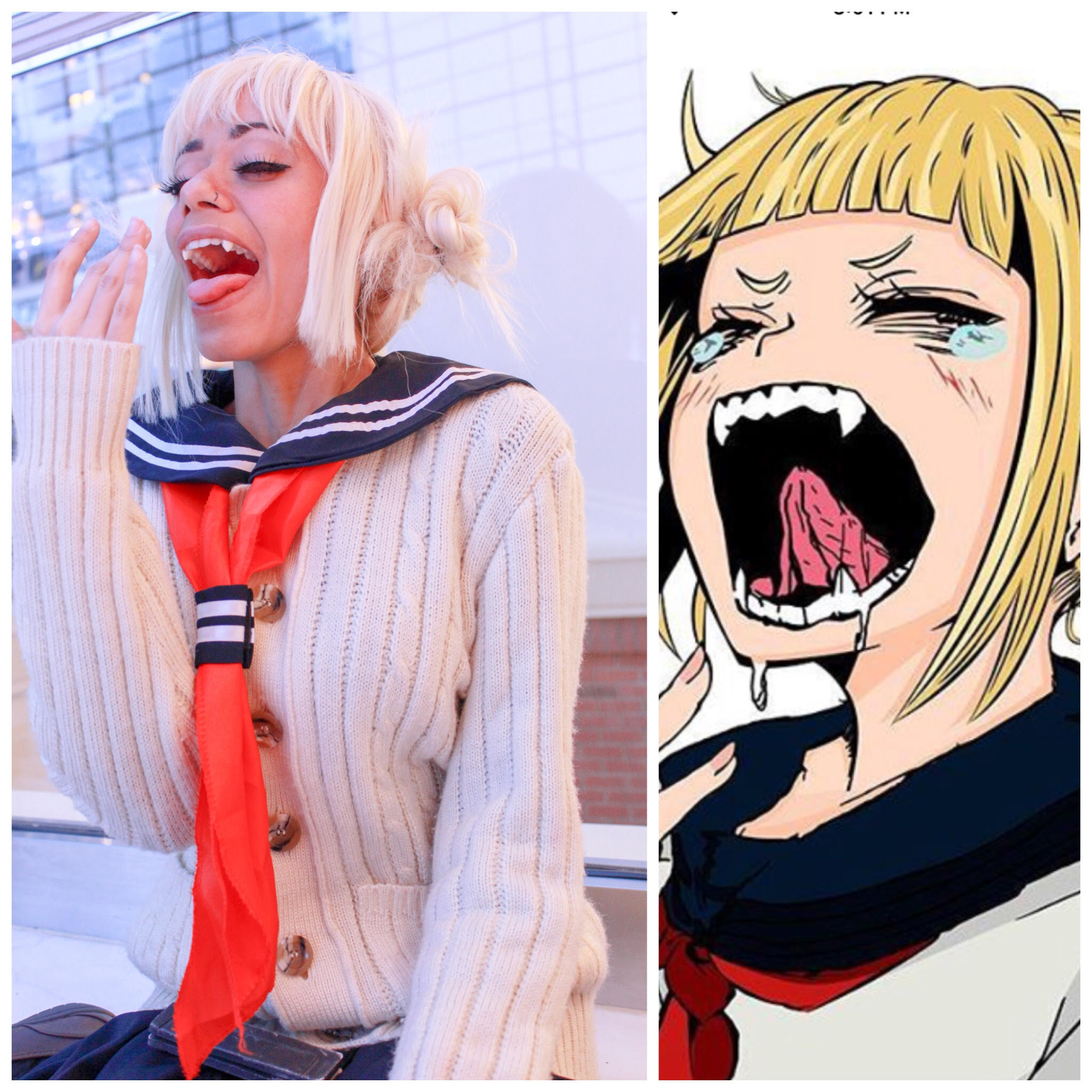
Anime has always been a part of my life. My love for the Japanese cartoon genre developed at a really early age. I grew up watching Pokémon Indigo League, Code Lyoko, Yugioh, and Sailor Moon. They built such believable worlds that captivated me, filling me with such heartfelt messages of friendship and trusting in your instincts. What drew me to anime was—compared to Western entertainment—the fact that characters in the genre are often more eccentric, and have vibrant personalities that I feel are usually left to “token” characters in Western media. These eclectic characters aren’t merely superficial, but are given depth and actually take the limelight. Moreover, in anime, race or even gender doesn’t define the characters; it’s so easy to see yourself as any of them.
As much as anime is fictional fantasy, the stories they tell have great messages and themes. One important issue I believe anime touches on so well is mental health; anime such as Rascal Does Not Dream of Bunny Girl Senpai, March Comes in Like a Lion, Tokyo Ghoul, or even the film A Silent Voice are but a few titles that moved me. As a Black woman, I could never relate to the main characters in movies or even cartoons because they were absolutely nothing like me. Anime more often depicts strong women in power, fighting crime, and even saving the world. Hayao Miyazaki showed me imaginative coming-of-age stories like Spirited Away and Howl’s Moving Castle with women front and center. It’s no wonder that I gravitated to anime at such an early age. I learned so much Japanese culture from watching anime that I eventually pursued studying it, which gave me the opportunity to live abroad in Japan.
Like for many others, Toonami used to be my only source for anime when I was growing up. It exposed me to some of the classics such as Naruto, Inuyasha, Death Note, and Fullmetal Alchemist Brotherhood that I still rewatch to this day. Once I finally discovered the secrets of the internet, I was deep-diving into as many series as I could possibly find. My middle and high school years consisted solely of watching anime and playing video games… until I discovered conventions. I went to my first convention, Megacon, in Orlando, Florida, and had absolutely no idea what cosplay was, but I saw all these people dressing up as these characters I obsessed over.
Cosplay quickly became my means of escape, and has been ever since. I was finally venturing outside of the house and meeting other people. The bonus: Everyone I met liked the same things as I did. I felt welcomed into a family I never knew I had. Both anime and cosplay are a part of who I am now. My appreciation for anime and Japanese culture as a whole will never change. I’m proud to call myself a weeb and encourage everyone out there to explore anime for themselves. If you haven’t watched any, you’re missing out; if you stopped, now is always the time to get back into it.
Mimi
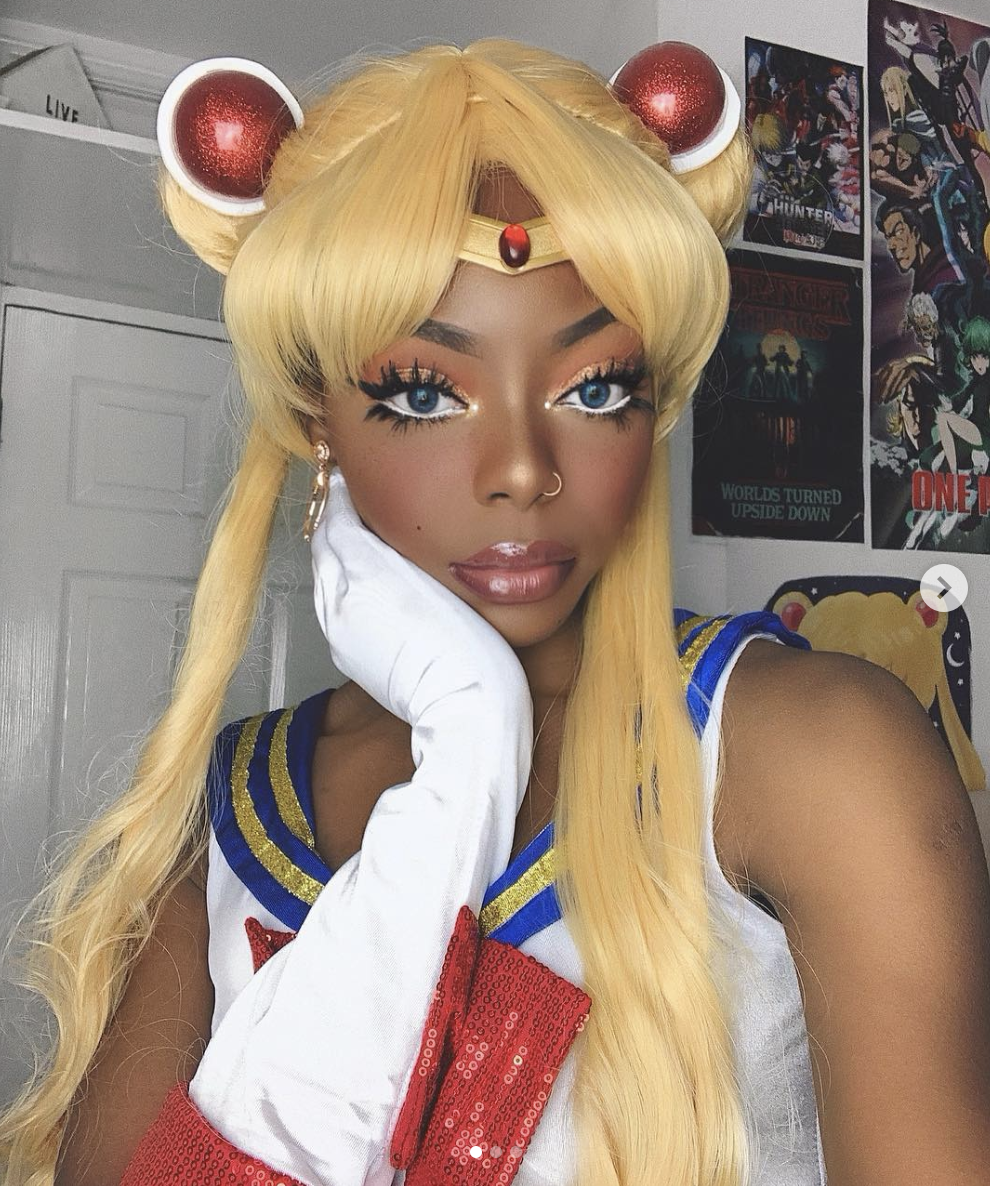
My first experience with anime was with Pokémon and Dragon Ball Z, because they were always on TV. Shortly after seeing those shows, in elementary school, I saw my first Studio Ghibli film, Princess Mononoke. It was from there that my interest in anime grew into my adult passion. I began dressing up as different characters as a child. I didn’t realize it was cosplay until I grew up and then started dressing up as some of my favorite superheroes and anime characters.
My first time cosplaying at a convention, I dressed as Sailor Neptune from Sailor Moon. I was very nervous cosplaying in public because being at conventions can be really intimidating, and I didn’t feel my skills were good enough. But from my experiences, I now know that my race definitely had something to do any judgmental looks or words. Cosplaying as a Black woman still attracts social media trolls, racists, and negative backlash; we are expected to only cosplay within our race and not other characters who are non-Black.
I have always had an interest in Japanese culture because my style has always been very kawaii [cute] and I relate to a few characters in anime, my favourite being Sailor Moon’s main character Usagi. Cosplay has also helped me with my confidence and has helped me to cope with my anxiety better. To me, it’s more than a hobby because it helped define who I am today—I want to become a professional cosplayer. I feel that race is irrelevant to cosplay, and that anyone can be whatever they want to be.
Sign up for our newsletter to get the best of VICE delivered to your inbox daily.
Follow Janae Price on Twitter.
This article originally appeared on VICE US.